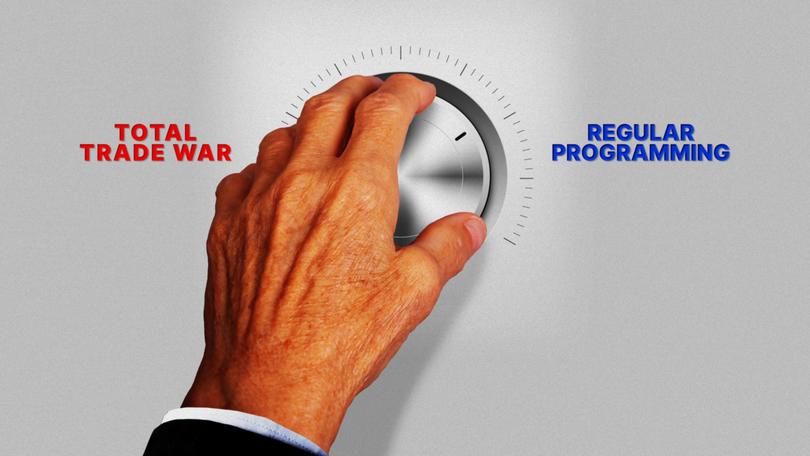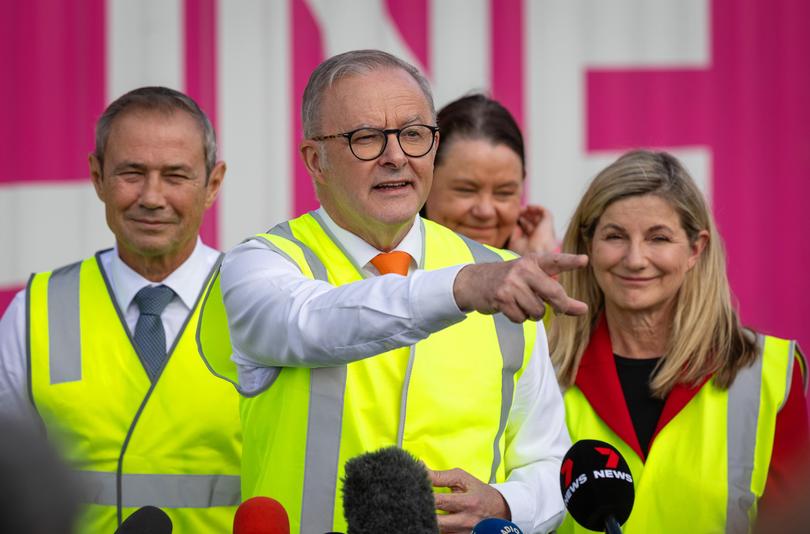Trump trade war: China's willingness to talk with US on tariffs offers fresh hope to Australia
The development in the tariff impasse has renewed Canberra’s optimism that Australia will be able to negotiate its own carve-out from a ten per cent ‘baseline’ levy.

China’s willingness to negotiate with the United States over trade levies has offered fresh hope to Australia that it will be able to mitigate the impact of the punishing new global tariff regime on the economy.
It has also stoked optimism that Canberra will be able to negotiate its own carve-out from a ten per cent “baseline” levy, and that it could use a newly announced Government stockpile of critical minerals to help do so.
Beijing signalled on Wednesday that “the door for talks is wide open” after US President Donald Trump said US tariffs on Chinese imports would be “substantially” reduced from the current rate of 145 per cent.
Sign up to The Nightly's newsletters.
Get the first look at the digital newspaper, curated daily stories and breaking headlines delivered to your inbox.
By continuing you agree to our Terms and Privacy Policy.“It won’t be that high, not going to be that high,” he told an Oval Office press conference on Tuesday, adding that a deal with China could happen “pretty quickly” and that “we’re going to live together very happily and ideally work together.”
The Chinese foreign ministry responded with caution the next day, while hinting at the possibility of finding a solution.
“We do not wish to fight, nor are we afraid of fighting,” said spokesperson Guo Jiakun, warning that if the US wanted to reach an agreement with China then “continuing to exert extreme pressure” was not the way to do it.
But after the International Monetary Fund (IMF) said this week the tariffs would “significantly slow” economic growth in the world’s major economies - hitting the US the hardest - it appears that Washington has been the first to blink.
US Treasury Secretary Scott Bessent told reporters on the sidelines of the IMF annual meeting on Wednesday that de-escalation was necessary for the world’s two largest economies to rebalance their trading relationship.
Asked whether that meant a reduction in the 145 per cent US tariffs on Chinese goods and China’s 125 per cent tariffs on US goods, he said there had to be one as “neither side believes that these are sustainable levels.”
He added: “This is the equivalent of an embargo and a break between the two countries in trade does not suit anyone’s interest.”
While a compromise between the world’s two largest economies still hangs in the balance, the prospect of even a reduction in the taxes they are imposing on each other has been welcomed in Australia, where the Government and business community have been bracing for the wider impact of a global trade war.
“The biggest risk for Australia in this whole issue is not the 10 per cent direct tariffs, it’s the knock-on effects from a major trade confrontation involving the US and China,” Andrew McKellar, CEO of the Australian Chamber of Commerce and Industry (ACCI) told The Nightly.
“The situation remains fluid. Hopefully it’s positive signs if there’s now some level of direct discussion potentially occurring between the United States and Chinese officials,” he said.
“We’ll be watching it closely, and we just have to hope that some progress can be achieved, because to have both sides at each other’s throats or seeking to impose significant trade measures, that’s not going to help anybody.”
Mr McKellar said there had been constant high-level engagement on the tariff regime throughout the election campaign, from Cabinet members to the ambassador to Washington, Kevin Rudd.
Officials were working behind the scenes to lay the groundwork for future talks and to head off potential risks, he said.
Negotiating a deal should be “high on the priority list” of the next Government, he said.
“At some point early in the next term, we would expect that there will be a direct contact meeting involving the Prime Minister and the President,” Mr McKellar added.
On Thursday, Prime Minister Anthony Albanese ducked a question at a Perth press conference on his plans to travel to Washington, saying only he had been invited by the president and would “of course, visit the United States” but that he was focused first on the May 3 election.
However, Mr Albanese also signalled again that his Government saw Australia’s wealth of critical minerals as potential leverage to cut a favourable tariffs deal with the US.
Mr Albanese used an address to The West Australian’s Leadership Matters forum on Thursday to detail a new $1.2b Critical Minerals Strategic Reserve which would be offered up for sale to key global partners, and which could be used as part of Australia’s negotiating strategy.
The Prime Minister told the forum that Australia must deal with global challenges by building on its national strengths and using its assets.

“This is why, in our response to the so-called reciprocal tariffs imposed by the United States in the beginning of this month, I announced that a re-elected Labor government would establish a critical mineral strategic reserve,” he said.
The reserve plan would include national off-take agreements that would allow the Government to buy a set volume at a set price to on sell, and it would also contain a smaller stockpile to ensure domestic supplies or counter market volatility.
The agreements would be used for a “priority sub-set” of the 31 critical minerals found in Australia, starting with those most important for artificial intelligence and tech-manufacturing.
“This will deliver a great, assertive industry and strengthen Australia’s standing as a trusted and reliable trading partner,” he told the forum.
“It will mean we can deal with trade and market disruptions from a position of strength, because Australia will be able to call on an internationally significant quantity of resources in global demand.”
At his later press conference, Mr Albanese declined to give further details about what critical minerals he was intending to put on the table with the US.
“I don’t issue ultimatums. What I do is engage diplomatically in our national interest, and it is in our national interest to use the full suite of leverage that is available to us. This is an element in that,” he said.
The Coalition on Thursday said it would not match the reserve plan, but it has previously floated the idea of critical minerals being used as a bargaining chip with Washington.
Critical minerals expert Huw McKay, from the Australian National University said the negotiating strategy was an “attractive” one, although cautioned that more government investment in the industry should occur regardless of any trade war.
“I think it’s a strategic priority of both sides of government to leverage critical minerals, as broad brush as that is, to support the mining industry, which is one of Australia’s export champions,” he said.
But Dr Jenny Gordon, former chief economist at DFAT, cautioned the prospect of using critical minerals in future talks was “overblown” because of the expense and difficulty of processing them.
Any rapprochement between China and the US to allow the resumption of natural trading was a positive, she added.
“The fact that they’re talking to each other is really good but again, it’s all going to be in the detail. We really don’t know what’s going to come out of there.”

